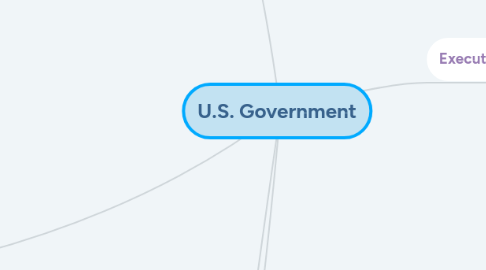
1. An example of this was the creation of the National Bank.
2. Legislative Branch
2.1. The Legislative Branch is responsible for passing laws
2.1.1. Congress
2.1.1.1. House of Representatives
2.1.1.1.1. Requirements
2.1.1.1.2. Current # of Senators is 438
2.1.1.1.3. Term length is 2 years and they can be considered for reelection every even year.
2.1.1.2. Senate
2.1.1.2.1. Requirements
2.1.1.2.2. Current # of Senators is 100
2.1.1.2.3. Term length is 6 years and they can be considered for reelection every even year.
2.1.2. Powers of the Legislative
2.1.2.1. Expressed/Enumerated Powers
2.1.2.1.1. Powers listed in the Constitution.
2.1.2.1.2. An example is the ability to levy taxes, borrow money, coin money, declare war, raise and support armed forces
2.1.2.2. Implied Powers/Elastic Clause
2.1.2.2.1. Give Congress the ability add to stretch its powers to meet the needs of the country over time.
3. Judicial Branch
3.1. Qualifications
3.1.1. There are no restrictions or rules to be a member of the Supreme Court
3.2. There are 9 Justices
3.2.1. They chosen by the president
3.3. The Cheif Justice
3.3.1. Serve until retire or dead
4. 10 Amendments
4.1. 1st
4.1.1. Protects the People’s Freedom of Speech, Religion, Press, Assembly and the Right to Petition the Government
4.2. 2nd
4.2.1. The right to bare arms
4.3. 3rd
4.3.1. Prohibits the sheltering of soldiers in your home during peacetime.
4.4. 4th
4.4.1. The state must have a specific reason to take evidence or search a person.
4.5. 5th
4.5.1. You can’t be tried for a crime without a grand jury indictment.
4.5.2. Protects against double-jeopardy.
4.5.3. You cannot be forced to testify against yourself.
4.5.4. “I plead the 5th”
4.6. 6th
4.6.1. Rights of the accused, speedy trial, trial of an impartial jury, to know the charges, to hear and question witnesses, and to a lawyer.
4.7. 7th
4.7.1. Right to a trial by jury in Federal courts to settle dispute over property worth more than $20
4.8. 8th
4.8.1. Protects against excessive fines and punishment, and it also protects against cruel and unusual punishment.
4.9. 9th
4.9.1. Rights of the people.
4.10. 10th
4.10.1. Powers of the states and people.
5. Executive Branch
5.1. Leaders (In order of who would be in acting President if something happens)
5.1.1. 1. President
5.1.1.1. Requirements
5.1.1.1.1. Age: 35 Years Old
5.1.1.1.2. Natural Born Citizens
5.1.1.1.3. Residency for at 14 Years
5.1.1.2. Term Length
5.1.1.2.1. 4 year year term but can get a possible second term if re-elected
5.1.1.3. Powers and Roles
5.1.1.3.1. Can grant pardons
5.1.1.3.2. Veto laws
5.1.1.3.3. Make treaties
5.1.1.3.4. Appoint commander in chief
5.1.1.3.5. Head of the military
5.1.2. 2. Vice President
5.1.2.1. Requirements
5.1.2.1.1. Same as the president
5.1.2.2. Term Length
5.1.2.2.1. 4 year year term but can get a possible second term if re-elected
5.1.2.3. Powers and Roles
5.1.2.3.1. Officer in the legislative branch
5.1.2.3.2. President of the Senate
5.1.2.3.3. May not vote except to cast a tie-breaking vote
5.1.3. 3. Speaker of House
5.1.4. 4. President Temporé
5.1.5. 5. Voted in by Congress
5.2. Departments
5.2.1. Treasury
5.2.2. Defense
5.2.3. Justice
5.2.4. Interior
5.2.5. Agriculture
5.2.6. Commerce
5.2.7. Labor
5.2.8. Health and Humans Services
5.2.9. Housing and Urban Development
5.2.10. Transportation
5.2.11. Energy
5.2.12. Education
5.2.13. Veterans Affairs
5.2.14. State
5.2.15. Homeland Security
